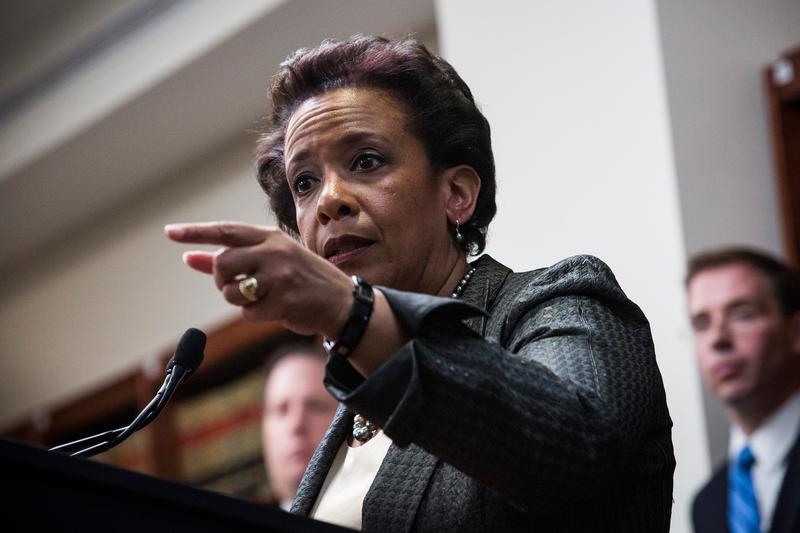
In June 1999, a 40-year-old prosecutor stood on the courthouse steps in Brooklyn before a horde of reporters. She and her team had already gotten a guilty plea from the New York City police officer who sodomized a Haitian immigrant named Abner Louima with a broomstick in a stationhouse bathroom. Now another officer had been convicted for his role in that night of violence, which included abuse of a second man.
“If there’s any message to be gained from this, it is that in this country and in this courtroom and in this district, we will not tolerate the kinds of assaults on citizens that were perpetrated on those two men,” she said.
Despite having spent months working on the biggest civil rights case in recent city history, she was still largely unknown. A reporter called out: “Name, please.”
“Loretta Lynch,” she said.
That once obscure prosecutor is now poised to become the next United States Attorney General, the first black woman to hold the job. The Senate is expected to vote on her confirmation his week.
If confirmed, she’ll run an agency that played an historic role in the civil rights battle between African Americans and local authorities in the South in the 1950s and '60s. It’s an agency that could play a similar role today — as tension between minority communities and police has led to widespread demonstrations and calls for change.
Lynch knows about the struggle for equality and justice first-hand as she alluded to during her confirmation hearings in January.
“My father, Lorenzo, who is here with me today, is a fourth-generation Baptist preacher who in the early 1960s opened his Greensboro church to those planning sit-ins and marches, standing with them while carrying me on his shoulders,” Lynch said.
As Attorney General she’ll take over a Justice Department that recently issued a scathing report on policing in Ferguson, Missouri. Her district office is also looking into the death of Eric Garner, the Staten Island man who died last summer during an arrest for selling loose cigarettes.
“Few things have pained me more than the recent reports of tension and division between law enforcement and the communities we serve. If confirmed as Attorney General, one of my key priorities would be to work to strengthen the vital relationships between our courageous law enforcement personnel and all the communities we serve,” Lynch told the Senate Judiciary Committee.
But that’s only part of her career. As the district’s top prosecutor, she supervised a range of cases that might only be possible in a city as diverse as New York.
“This is an office that has a longtime expertise and commitment to doing large scale gang cases, has long done organized crime cases, union corruption cases, political corruption cases, terrorism cases, fraud,” said Daniel Richman, a law professor at Columbia University and former federal prosecutor.
Lynch was 30 in 1990 when she left a private law firm to be a prosecutor in the Eastern District of New York. The Harvard Law School grad’s first big case was a sprawling, three-month trial that brought down an Asian street gang called the Green Dragons.
Former prosecutor Alan Vinegrad was working across the hall from Lynch in a windowless basement with borrowed furniture prosecuting his own Asian gang case.
“There’d be sort of a clack of agents and cops in both of our offices coming in and out and my recollection is at some point I noticed a couple of times there was this elderly African American gentleman, you know, waiting outside her office,” Vinegrad said. “And so at some point I went up to him and said something along the lines of, 'Can I help you?' or, 'Are you waiting for somebody?' And he very nicely explained that he was Loretta’s father and he was there to make sure that she had lunch in between the morning and afternoon sessions of the trial.”
Over the next decade, that work ethic fueled her rise to number two in the office, before President Bill Clinton nominated her to the top spot in 1999.
When he left office, she went back to private practice as a white-collar criminal defense lawyer for clients like pharmaceutical companies and defense contractors. She also did pro bono work in Rwanda helping lawyers prosecuting genocide.
President Obama brought her back to head the district in 2010. In her second go-round, she oversaw some high-profile cases, including the recent prosecution of a Staten Island congressman, Michael Grimm.
Yet her office is often overshadowed by the Southern District of New York, where U.S. Attorney Preet Bharara has waged high-profile campaigns against insider trading and public corruption.
“The tone Loretta Lynch has set in the Eastern District has been one of quiet professionalism, doing your job, developing cases, not having any flash,” Richman said.
It’s unclear what Lynch can do with the short time she’s likely to have in the job — Obama leaves office in less than two years. But in such a high-profile position, circumstances could dictate her place in history.
“In a moment, whether it’s a terrorism attack or some other kind of massive need for federal criminal enforcement, the Attorney General and the whole federal criminal apparatus can all of a sudden be a place where no one could ever be a caretaker,” Richman said.
If confirmed, Loretta Lynch will be the first U.S. Attorney elevated directly to Attorney General in nearly 200 years.
